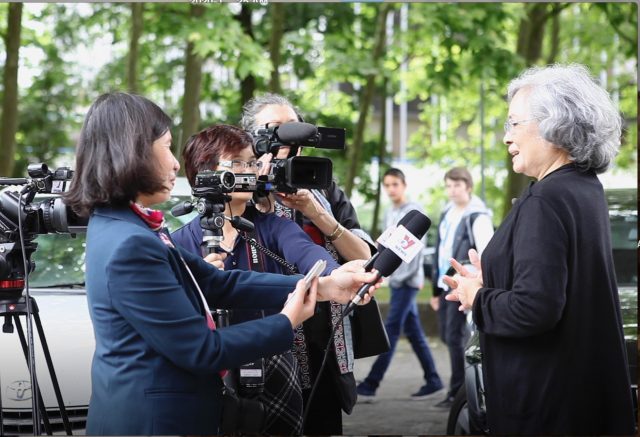
French-Vietnamese activist, journalist, and author Tran To Nga continues the fight in The People vs. Agent Orange,
THE PEOPLE vs. AGENT ORANGE (Kate Taverna and Alan Adelson, 2020)
New Plaza Virtual Cinema
Opens Friday, March 5
www.thepeoplevsagentorange.com
newplazacinema.org
As a teenager, I first became aware of the government’s use of Agent Orange in Vietnam on a 1980 episode of Barney Miller, in which Sgt. Wojciehowicz (Max Gail) calls in representatives from the air force, the government, and a chemical company to explain the possibly dangerous side effects of the compound. (Their ultimate answer: They just don’t know.) In 1982, I was at Pier 84 for a benefit concert for victims of Agent Orange, featuring Ian Hunter, Todd Rundgren, Paul Butterfield, and John Cale. Nearly forty years later, it took another form of popular entertainment to make me aware that many of the problems associated with the herbicide have not gone away — and are still being denied by those using the vilified chemical compound.
“I was born in war, I grew up in war, and we are at war now,” French-Vietnamese activist, journalist, and author Tran To Nga says early on in Kate Taverna and Alan Adelson’s award-winning documentary, The People vs. Agent Orange, opening virtually March 5 at New Plaza Cinema here in New York City. The film details the long-lasting effects of the deployment of Agent Orange on four generations in Vietnam as well as the devastating impact it is having in the Pacific Northwest, specifically in Five Rivers in Oregon, where it is used for brush eradication. Yes, “is,” present tense.
Written and produced by Taverna, Adelson, and Véronique Bernard, directed by Taverna and Adelson (In Bed with Ulysses, Lodz Ghetto), and edited by Taverna, the revelatory film follows two converging story lines: Nga’s fight for justice in Paris and South Vietnam and environmentalist and author Carol Van Strum’s battle over the deployment of Agent Orange, made with the controversial chemical Dioxin (in 2,4,5-T and 2,4-D), in Oregon’s Five Rivers area between 1975 through today. Taverna and Adelson meet with human rights lawyers, including Bruce Anderson and Jonathan Moore working with Van Strum and Susan Swift, who formed the group Citizens Against Toxic Sprays (C.A.T.S.), and Bertrand Repolt, William Bourdon, and Amélie Lefebvre representing Nga, who know it won’t be easy, as the chemical companies (Dow, Monsanto) are not about to give in. “This case will be merciless,” Bourdon says.
The filmmakers incorporate archival footage of news reports and interviews from the 1960 and 1970s, whistleblower video taken by Oregon spray helicopter crew member Darryl Ivy in 2015, and home movies and photos of Van Strum, Nga, and their families, detailing the terrible personal tragedies they have suffered. Nga visits a children’s hospital where kids have severe birth defects, walks through the tiger cages in Poulo Condor Prison on Con Dao Island in Vietnam where her mother was tortured, and returns to the forest where she and her husband, Kieu Xuan Long, were married. Van Strum and Swift discuss how they have been followed, intimidated, and harassed by mysterious men in black cars. Retired Oregon physician Dr. Renee Stringham talks about how, after recording a serious increase in the number of birth defects among her patients, her family was threatened. And Heather Bower, founder of Children of Vietnam Veterans Health Alliance, shares her information about birth defects wile displaying her own.
Among the other experts adding their voices are David Zierler, author of The Invention of Ecocide, Peter Sills, lawyer and author of Toxic War, André Bouny, author of Agent Orange: Apocalypse Vietnam, former Senate majority leader Thomas Daschle, and retired air force scientist Dr. James Clary, who chokes up when he says, “I was getting so angry that my own government didn’t want to provide help to veterans who were suffering.” Nobody goes on the record to defend the chemical companies, although retired senior US district judge Jack Weinstein tiptoes around some pointed questions.
“Agent Orange spared no one,” Nga says. And the horrors are far from over. To find out more, you can watch two recent panel discussions featuring the filmmakers, Van Strum, and other activists, researchers, and journalists here.